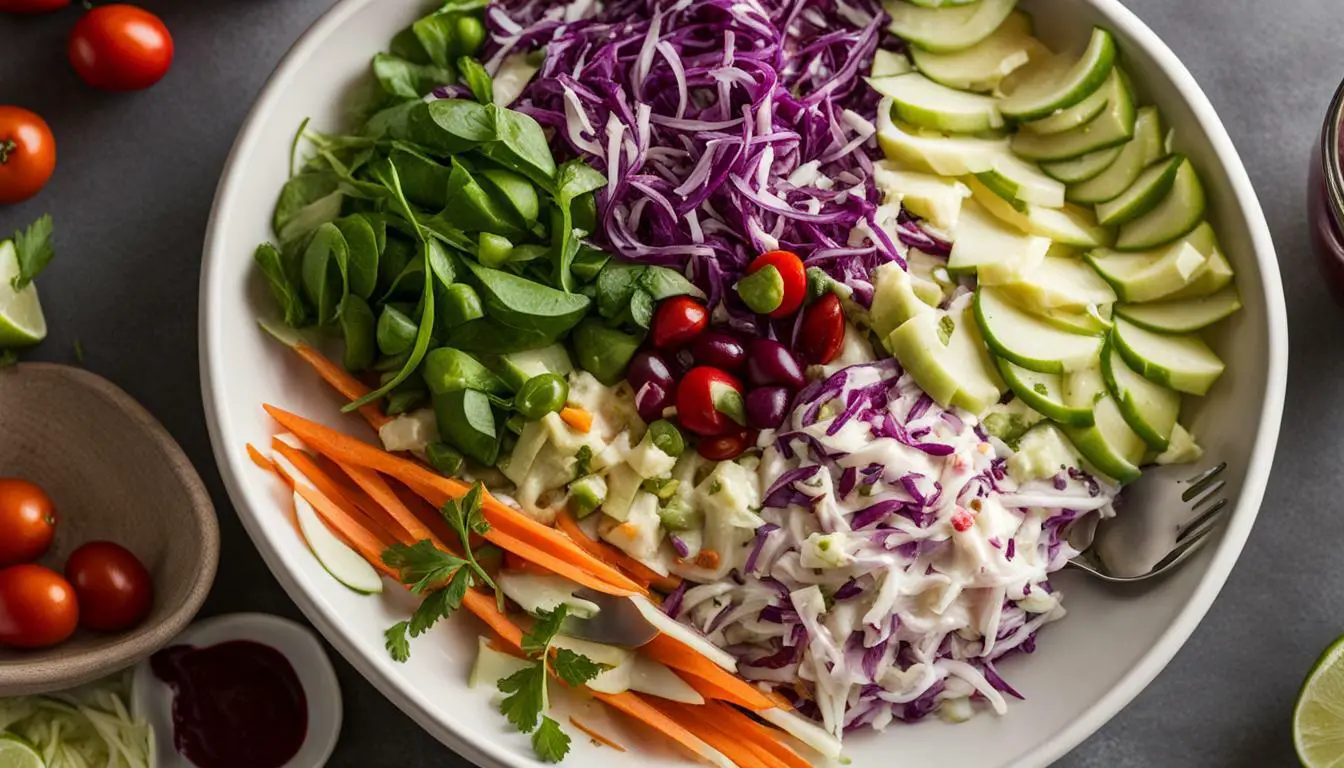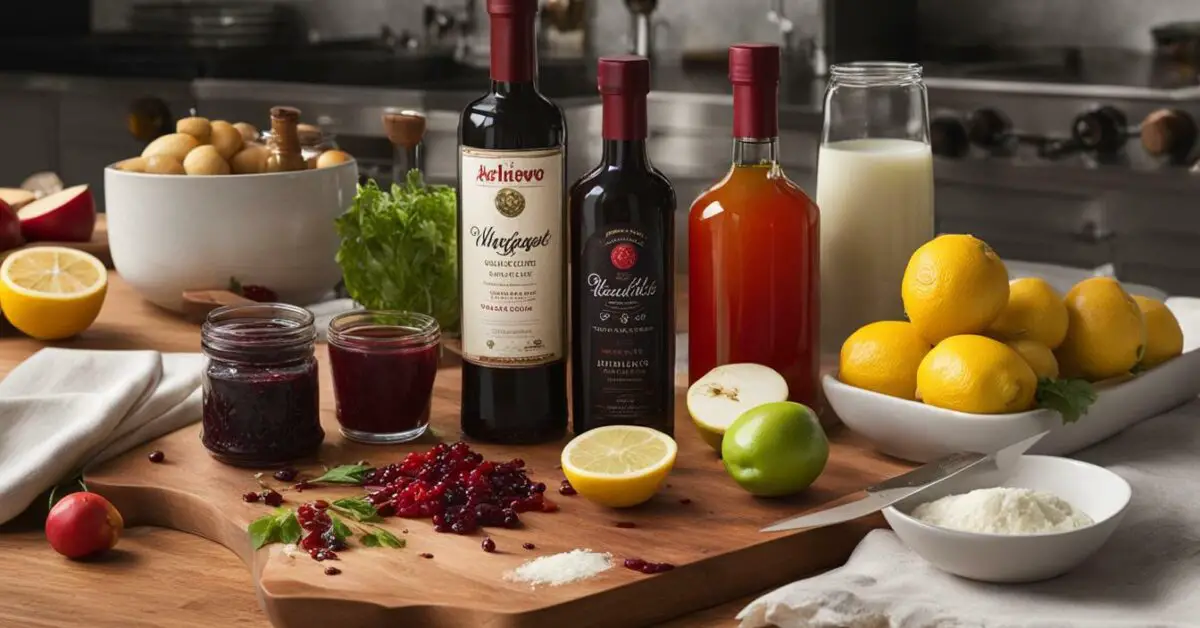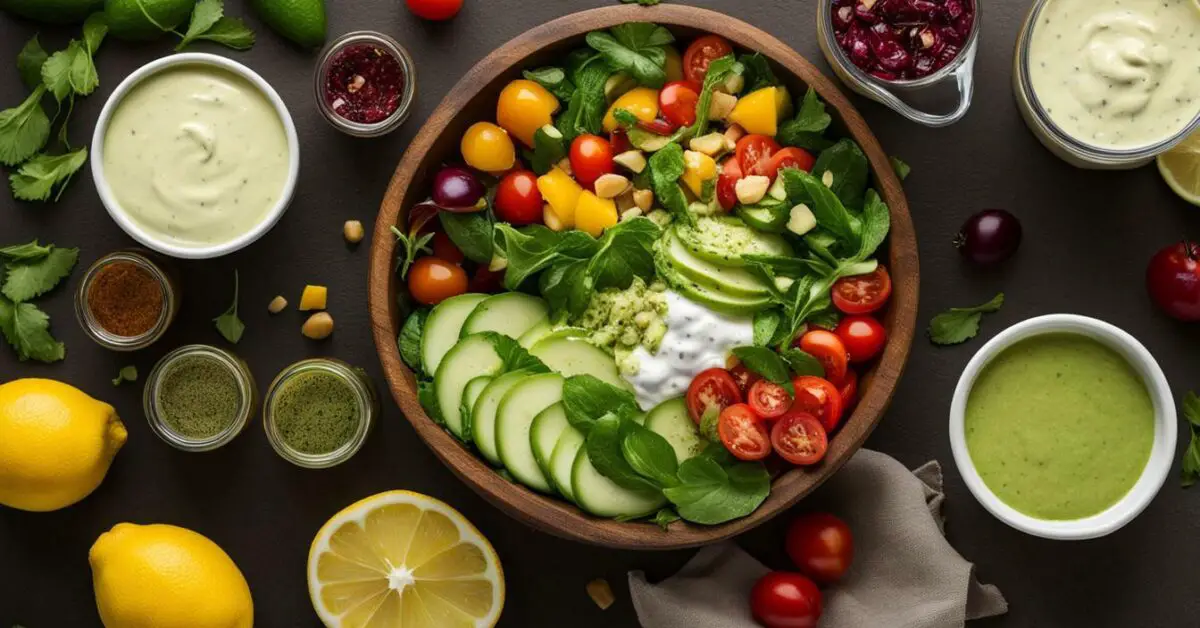
This post may contain affiliate links. Please read my disclosure for more information.
Are you looking for a substitute for vinegar in coleslaw? Discover the top 5 alternatives that can enhance the flavors of your coleslaw without compromising taste.
When looking for substitutes for vinegar in coleslaw, there are several options to consider. Lime juice and lemon juice are both good substitutes, although they have a distinct taste that may change the flavor of the coleslaw. Yogurt, sour cream, and buttermilk can also be used as substitutes, although they will result in a milder tanginess. Dill pickle relish and kombucha can add a unique flavor to the coleslaw dressing, while ketchup can provide a sweet and tangy taste. Kefir is another option that can be used, especially when combined with other fermented foods.
When it comes to vinegar options, white vinegar, apple cider vinegar, white wine vinegar, and rice vinegar are all good choices. However, it is best to avoid using balsamic vinegar in coleslaw as it has a strong tart-sweet flavor that could overpower the other ingredients.
Overall, the best substitute will depend on personal preference and the desired flavor profile for the coleslaw. Experimenting with different alternatives can lead to exciting new flavors and a unique twist on this classic dish.
Lime Juice, Lemon Juice, Yogurt, Sour Cream, and Buttermilk
Lime juice and lemon juice are great substitutes for vinegar in coleslaw, although they can alter the flavor profile. The citrusy tang of lime juice adds a fresh and zesty twist to your coleslaw, while lemon juice offers a slightly sweeter and more pronounced acidity. These juices can be used in equal proportions to vinegar, but it’s important to note that they may impart a distinct taste to your coleslaw. If you’re a fan of bold and vibrant flavors, lime juice or lemon juice can be the perfect substitution.
Alternatively, if you prefer a milder tanginess, yogurt, sour cream, and buttermilk can be used as substitutes for vinegar in coleslaw. These dairy-based ingredients add a creamy and smooth texture to the dressing, while providing a subtle tanginess. Yogurt works well for a lighter and slightly acidic taste, sour cream adds richness and depth, and buttermilk offers a gentle tang and creaminess. Experiment with these ingredients to find the perfect balance of flavors for your coleslaw.
In summary, when looking to substitute vinegar in coleslaw, lime juice and lemon juice can bring a citrusy twist, while yogurt, sour cream, and buttermilk provide a milder tanginess. Consider your personal preference and desired flavor profile to choose the best alternative for your coleslaw. Don’t be afraid to get creative and try different combinations to find the perfect substitute that suits your taste buds!
Dill Pickle Relish, Kombucha, Ketchup, and Kefir
Looking for a unique twist to your coleslaw dressing? Try adding dill pickle relish, kombucha, ketchup, or kefir as substitutes for vinegar to create a distinct flavor profile.
Dill pickle relish can bring a tangy and slightly sweet taste to your coleslaw. Made from finely chopped pickles, it adds a crunchy texture and a burst of flavor that complements the other ingredients. Simply mix in the relish with the coleslaw dressing for a zesty kick.
Kombucha, a fermented tea beverage, offers a complex and slightly tart flavor to your coleslaw. The probiotic nature of kombucha enhances the health benefits of your dish while adding a subtle tanginess. Incorporate it into the dressing by using kombucha as a base or by combining it with other ingredients like mayo or yogurt.
If you’re looking for a sweeter and tangier coleslaw, try using ketchup as a substitute for vinegar. The rich tomato flavor adds depth to the dressing, while the natural sweetness balances out the tanginess. Mix it in with the desired amount to achieve the desired taste.
Last but not least, kefir, a fermented milk beverage, can lend a creamy and slightly tangy note to your coleslaw. It not only provides a unique flavor but also boosts the nutritional value of your dish with its probiotic content. Use kefir as a base for your dressing or mix it with other ingredients to create a velvety texture.
Experimenting with these alternatives can help you discover new flavors and create a coleslaw that stands out. Whether you prefer a tangy crunch from dill pickle relish, a probiotic kick from kombucha, a sweet and tangy taste from ketchup, or a creamy tanginess from kefir, there are plenty of options to explore. Remember, the choice of substitute depends on personal preference and the desired flavor profile for your coleslaw.
Conclusion
In conclusion, there are numerous substitutes for vinegar in coleslaw, ranging from lime juice and lemon juice to yogurt, dill pickle relish, and kombucha. The choice of substitute ultimately depends on individual taste preferences and the desired flavor profile for the coleslaw.
Lime juice and lemon juice are both excellent alternatives to vinegar, offering a tangy and citrusy flavor. However, it’s important to note that they can subtly alter the overall taste of the coleslaw. If you prefer a milder tanginess, yogurt, sour cream, or buttermilk can be used as substitutes, resulting in a creamier and smoother dressing.
If you’re looking for unique flavor contributions, dill pickle relish and kombucha are worth considering. Dill pickle relish adds a hint of pickle flavor, while kombucha brings a slightly fermented and effervescent taste to the dressing. On the other hand, if you prefer a sweeter and tangier coleslaw, ketchup can be used as a substitute.
Kefir, a fermented milk drink, can also be used as a substitute for vinegar, especially when combined with other fermented foods. However, it’s important to choose the right type of vinegar if you decide to stick with it. White vinegar, apple cider vinegar, white wine vinegar, and rice vinegar are all good options. It’s best to avoid using balsamic vinegar in coleslaw, as its strong tart-sweet flavor can overpower the other ingredients.
Ultimately, the best substitute for vinegar in coleslaw depends on your personal preference and the desired flavor profile you want to achieve. Feel free to experiment with different substitutes to create a coleslaw that suits your taste buds perfectly.
FAQ
What are some good substitutes for vinegar in coleslaw?
Lime juice, lemon juice, yogurt, sour cream, buttermilk, dill pickle relish, kombucha, ketchup, and kefir can all be used as substitutes for vinegar in coleslaw.
How do lime juice and lemon juice work as substitutes?
Lime juice and lemon juice can provide a tangy flavor to coleslaw, although they have a distinct taste that may alter the overall flavor of the dish.
What about yogurt, sour cream, and buttermilk?
Yogurt, sour cream, and buttermilk can be used as milder tanginess substitutes for vinegar in coleslaw, resulting in a creamy and slightly tangy flavor.
Can dill pickle relish, kombucha, and ketchup be used as substitutes?
Yes, dill pickle relish, kombucha, and ketchup can add unique flavors to coleslaw dressing, enhancing the taste of the dish.
Is kefir a suitable substitute for vinegar in coleslaw?
Yes, kefir can be used as a substitute for vinegar, especially when combined with other fermented foods. It imparts a tangy flavor to the coleslaw.
Which types of vinegar are good alternatives for coleslaw?
White vinegar, apple cider vinegar, white wine vinegar, and rice vinegar are all suitable choices as vinegar substitutes in coleslaw.
Should I use balsamic vinegar as a substitute for coleslaw?
It is best to avoid using balsamic vinegar in coleslaw as it has a strong tart-sweet flavor that could overpower the other ingredients.
How do I choose the best substitute for vinegar in coleslaw?
The best substitute will depend on personal preference and the desired flavor profile for the coleslaw. Experiment with different alternatives to find the taste you prefer.


